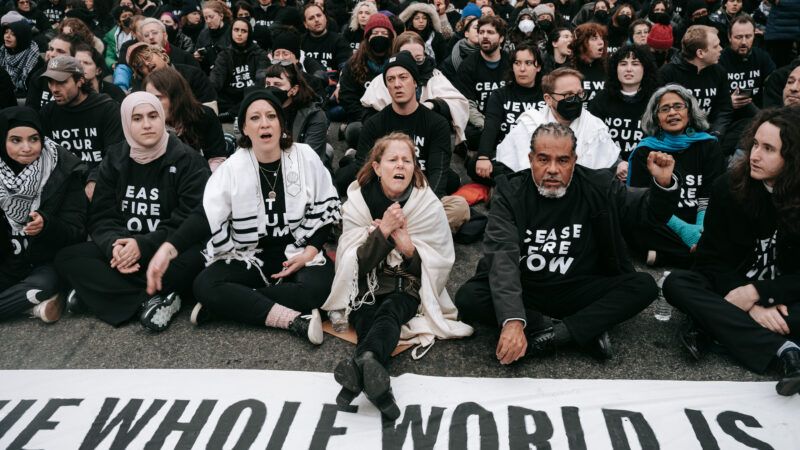No, Blocking Traffic Is Not Protected by the First Amendment
The freedom to protest is essential to the American project. It also does not give you carte blanche to violate other laws.

On Saturday, Ronald Reagan Washington National Airport (DCA) posted a warning on X, formerly known as Twitter. "TRAFFIC ALERT," it read. "Expect delays around the airport due to a group in vehicles exercising first amendment rights in roadway. Use caution and expect slow moving vehicles."
The post was a reference to a caravan, with several vehicles flying Palestinian flags, that claimed every lane as they inched along the roadway to the airport, reportedly causing hefty traffic delays.
It is certainly a driver's free speech prerogative to fly their flag of choice. That has nothing to do, however, with obstructing traffic, which is entirely irrelevant to the First Amendment.
One legally confused post from an airport in Virginia doesn't necessarily say much when viewed in a vacuum. But the assertion is indicative of a larger trend, as highway blockades continue to pick up steam across the country. In January, pro-Palestine activists cut off access to the Brooklyn, Manhattan, and Williamsburg Bridges, along with the Holland Tunnel, during rush hour. We've seen similar demonstrations in Seattle, Boston, Chicago, San Francisco, and Philadelphia. That list is not exhaustive. And DCA is not the first airport targeted by protesters: In late December, for example, demonstrators obstructed traffic outside Kennedy International Airport and Los Angeles International Airport during one of the busiest travel weeks of the year.
A settlement in New York essentially seeks to sanction the practice. "Where an FAA [First Amendment Activity] temporarily blocks vehicular or pedestrian traffic or otherwise obstructs public streets or sidewalks, the NYPD [New York Police Department] shall whenever possible accommodate the demonstration," reads a proposed agreement between the American Civil Liberties Union (ACLU) of New York, the Legal Aid Society, New York Attorney General Letitia James, and the NYPD in response to lawsuits pertaining to the police's handling of various protests in 2020.
The settlement is still up in the air; the police union is trying to fight it. But there is something richly ironic about the state's top law enforcement officer attempting to give the public a green light to break the law. And the ACLU, also involved in the settlement, acknowledges in its own guidance that detaining people by blocking a roadway is not a legal, First Amendment–protected activity.
"The right to peacefully assemble and protest is sacrosanct and foundational to our democracy," said New York Attorney General James in September after the settlement was unveiled. "Too often peaceful protesters have been met with force that has harmed innocent New Yorkers simply trying to exercise their rights."
James is correct that freedom of expression is crucial and central to the American project. It's also not a force field by which people are shielded from other rules. If I want to get people's attention by, say, driving 120 miles an hour while sporting a Palestinian flag, I cannot tell the officer who pulls me over for reckless driving that I'm simply exercising my free speech rights. The First Amendment does not give carte blanche to violate the law.
Activists may invoke the father of the civil rights movement, Martin Luther King Jr., when defending blockades. That's understandable. It's also misguided. As I wrote in 2022:
Though King did lead a protest from Selma to Montgomery, famously filling the Edmund Pettus Bridge, it was a march. It did not block interstate and highway traffic indefinitely for the sake of it—a tactic King was not comfortable with, despite pressure in the 1960s to get on board. "Even though King didn't come out and criticize it in public, in private he thought it was a misguided tactic," said Brandon Terry, assistant professor of African and African American Studies and Social Studies at Harvard University. "The NAACP thought it was ridiculous." King reportedly posited that such a move pushed the boundaries of acceptable demonstrations and would come back to bite the movement politically.
Protesting isn't meant to be convenient. But you might find it difficult to convince people you're the good guy when your blockades are hurting the vulnerable people you often claim to stand for, like this man who may have lost his parole, or this woman who went into labor.
Some folks may disagree. That is indisputably their right, and I'm thankful for that. Also not in dispute: It is not their right to detain people, no matter how righteous they believe their cause to be.


Show Comments (170)